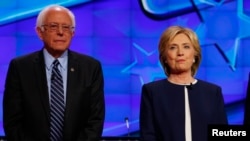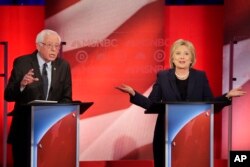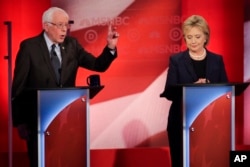Much of the fireworks at Thursday's Democratic presidential debate in New Hampshire focused on money: Hillary Clinton's acceptance of donations and speaking fees from Wall Street and Bernie Sanders' definition of wealth and the top 1 percent in the U.S.
Former Secretary of State Clinton and Vermont Senator Sanders had several heated exchanges regarding her ties to the financial sector.
When Sanders pointed out Clinton has received high speaking fees from large Wall Street financial firms, she accused Sanders of conducting an "artful smear" by alleging that anyone getting big money is being "bought."
Wall Street influence
Clinton argued that Wall Street is "trying to beat me in this primary," saying that they had spent as much as $6 million to defeat her.
However, a super political action committee supporting her campaign received more than $17 million from people in the securities and investment industry last year, according to campaign finance watchdog OpenSecrets.org. They also donated nearly $3 million directly to her campaign, the website reported.
For even more perspective, Clinton has received more money from the financial sector during her Senate and presidential campaigns than her husband, former President Bill Clinton, did in his 25-year political career, The Washington Post reported Thursday.
Clinton, who called herself a "progressive who gets things done," said Sanders' proposals for free college and health care are promises that cannot be kept.
"I am not going to talk about big ideas ... and then not level with people about how much it will cost," she said. "The numbers just don't add up."
Cost of proposals
An analysis by the nonpartisan Committee for a Responsible Federal Budget seemed to bolster her argument. The analysis found that the tax increases in Sanders' plan would only cover about 75 percent of the estimated spending under the plan, creating at least a $3 trillion hole over 10 years.
Sanders also repeated a phrase he uses often: "Almost all new income and wealth is going to the top 1 percent."
However, the numbers he uses -- research by University of California ecnomist Emmanuel Saez -- is outdated, AP reports.
Saez's research found from 2009-2014 that the richest 1 percent captured 58 percent of income growth, which doesn't qualify as "almost all." However, from 2009-2012, the richest 1 percent did capture 91 percent of the growth in income.
Yet part of that gain reflected an accounting maneuver as the wealthiest pulled income forward to 2012 in advance of tax increases that took effect in 2013 on the biggest earners, AP reported.
Trade deal questions
On the Trans-Pacific Partnership trade deal, MSNBC moderator Chuck Todd asked Clinton about the timing of her opposition to the agreement, saying she only recently opposed it, yet supported it in 2012 while secretary of state.
Clinton said Thursday night she "was holding out hope" that the deal would be one she could support. But once she saw the final version, "I opposed it."
However, as secretary of state, she often spoke highly of the agreement, even calling it "the gold standard in trade agreements" in 2012.
And on the subject of trade agreements, Sanders said he is open to fair trade, but opposes any existing U.S. trade deals, including NAFTA (the North American Free Trade Agreement). He claimed Thursday night that existing deals have cost "millions" of U.S. jobs.
Clinton's husband, former President Bill Clinton, lobbied for the deal and signed it.
A 2015 report from the nonpartisan Congressional Research Service also stated the net overall effect of the trade deal was minimal on the U.S. economy, primarily "because trade with Canada and Mexico accounts for a small percentage of U.S. GDP."
Some material for this report came from AP, Politifact.com and Factcheck.org.















